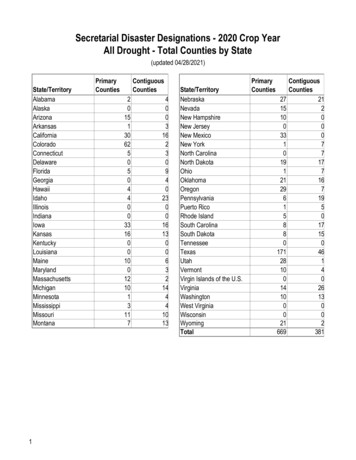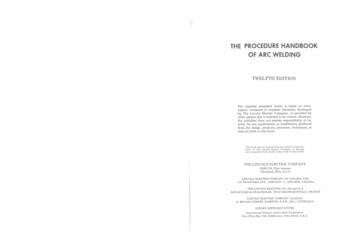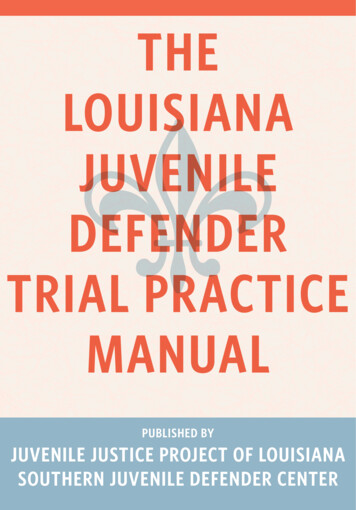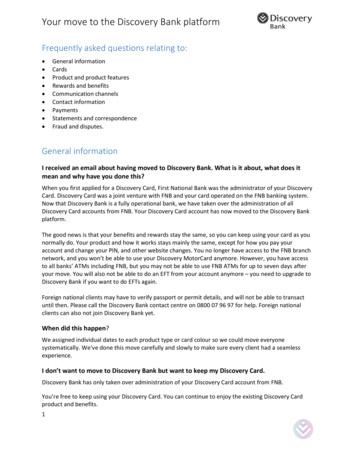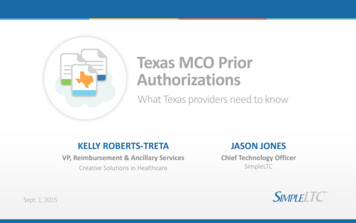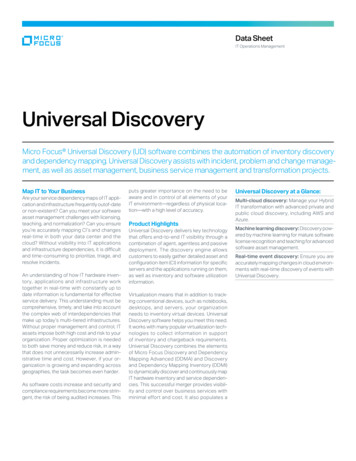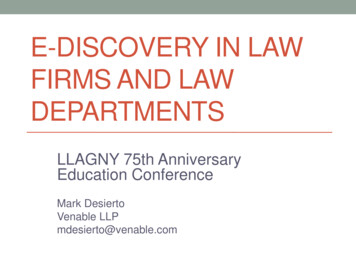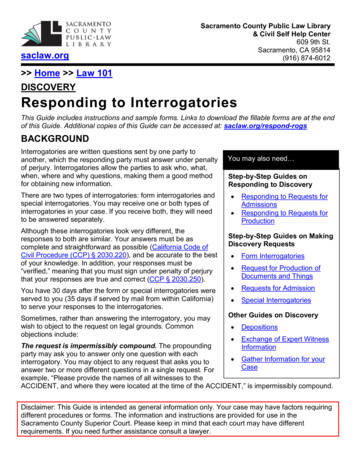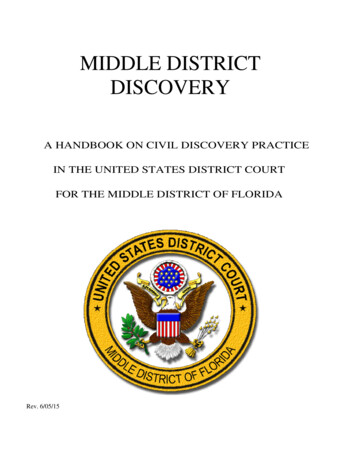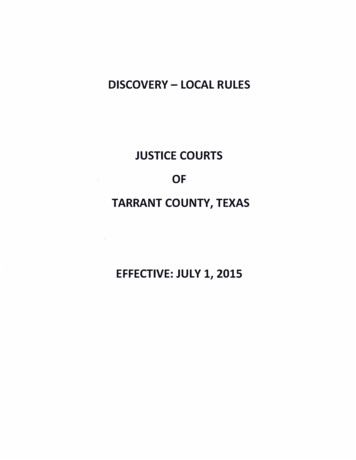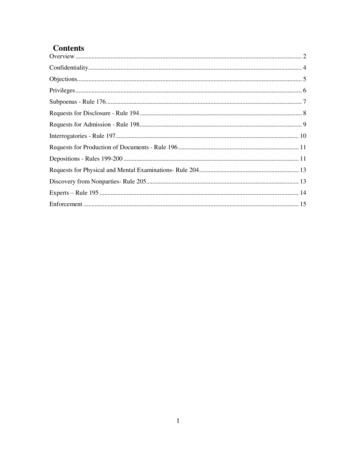
Transcription
ContentsOverview . 2Confidentiality. 4Objections. 5Privileges . 6Subpoenas - Rule 176 . 7Requests for Disclosure - Rule 194 . 8Requests for Admission - Rule 198 . 9Interrogatories - Rule 197. 10Requests for Production of Documents - Rule 196 . 11Depositions - Rules 199-200 . 11Requests for Physical and Mental Examinations- Rule 204 . 13Discovery from Nonparties- Rule 205. 13Experts – Rule 195 . 14Enforcement . 151
SECTION 6 DISCOVERYNovember 2013Ideally, discovery enables the parties to narrow the scope of the litigation, resolve a caseinformally, or prepare for trial by revealing the operative facts and evidence supportingeach party’s position. Limited time frames for resolving child protection suits make itcritical for attorneys representing DFPS to be able to propound and respond to discoveryefficiently and with an eye to the overall case strategy. This section is designed to givepractitioners a working knowledge of the most common discovery issues encountered inchild abuse and neglect litigation. While certain aspects of child protection litigationmake some discovery methods more useful than others, the same rules apply as in anycivil litigation.OverviewThe scope of discovery legitimately includes any matter that is not privileged and isrelevant to a claim or defense or reasonably calculated to lead to the discovery ofadmissible evidence. When the best interest of a child is at issue, this principle isgenerally applied broadly. Discovery can include: The names and contact information of persons with knowledge of relevant facts,and a brief statement of the person’s connection to the case; The names and contact information of trial witnesses; Detailed information about testifying expert witnesses and any consulting expertwhose opinions a testifying expert has reviewed; A description and other information about documents and tangible things; Contents of any settlement agreements; Written or recorded witness statements; and The opposing party’s legal contentions and the factual bases for each. 1Virtually every Suit Affecting the Parent Child Relationship (SAPCR) filed by DFPS willbe subject to Level 2 discovery. When this discovery level applies: Discovery begins when suit is filed and ends 30 days before trial; 2 Interrogatories are limited to 25; and 3 Depositions are limited to 50 hours for each side. 41TEX. R. CIV. P. 192.3.TEX. R. CIV. P. 190.3 (b)(1)(A) (for cases filed under the FAMILY CODE).3TEX. R. CIV. P. 190.3(b)(3) (limit on interrogatories does not include requests to identify or authenticatedocuments, but each subpart of an interrogatory is counted separately).4TEX. R. CIV. P. 190.3(b)(2) (unless one side has more than two experts).22
A propounding party can maximize the value of discovery by strategically designing eachdiscovery request to build on responses from the previous requests. Similarly the processof marshalling relevant information to respond to discovery often benefits the respondingparty by facilitating an assessment of the strengths and weaknesses of a case.The duty to supplement or amend discovery responses requires a further response tocorrect or complete a response within a reasonable time after a party becomes aware ofthe need for further response. A supplementary response made less than thirty (30) daysbefore trial is presumed not to be reasonably prompt. 5In summary, the discovery rules provide: Except as specifically prohibited, the parties may enter into a Rule 11 agreementor the court may order modification to discovery procedures for good cause; 6 All discovery requests, notices, objections and responses (except interrogatoryresponses in most instances, see below) must be signed by the attorney of recordor an unrepresented party; 7 The signature of an attorney or party on a response to a request for disclosurecertifies that to the best of the signer's knowledge, information and belief, thedisclosure is complete and correct at the time it is made; 8 The signature of an attorney or party on a discovery request, notice, response orobjection is a certification that to the best of the signer’s knowledge, informationand belief, after reasonable inquiry, the document is consistent with the applicablerules of civil procedure (or a good faith extension of same), has a good faithfactual basis, is not made for any improper purpose and is not unreasonable orunduly burdensome; 9 and Before bringing a motion to compel discovery, the moving party must certify thata good faith effort was made to resolve the dispute without court intervention. 10Generally, discovery requests and responses are not filed with the court, with theexception of: Discovery requests, deposition notices, and subpoenas served on nonparties; Discovery motions and responses to motions; Rule 11 agreements regarding discovery; Discovery the court orders to be filed; Discovery filed in support of or in opposition to a motion or similar courtproceeding; and Discovery materials necessary for an appeal. 115TEX. R. CIV. P. 193.5(b).TEX. R. CIV. P. 191.1.7TEX. R. CIV. P. 191.3(a).8TEX. R. CIV. P. 191.3(b).9TEX. R. CIV. P. 191.3(c).10TEX. R. CIV. P. 191.2.11TEX. R. CIV. P. 191.4(b),(c).63
Discovery that is not filed with the court must be retained during trial and any appealcommenced within six months after the judgment is signed. 12TIP:It is not uncommon for DFPS to provide a redacted copy of a CPS file to a party withouta formal discovery request. This is authorized and can be an efficient way to shareinformation. Attorneys do need to be aware that this type of exchange of informationdoes not obviate the need to comply with a formal discovery request or with local rules orpractices.ConfidentialityConfidentiality provisions require redacting of DFPS documents in response to adiscovery request to edit material that is not subject to release. In general, DFPS mustwithhold: All reports of alleged abuse or neglect and the identity of the reporter; 13 The files, reports, audio and videotapes, and documents generated pursuant to aninvestigation, with limited exceptions; 14 and Records obtained by DFPS from another source, if release to the requestor isprohibited by state or federal law. 15Identifying information regarding the following persons must also be redacted: Reporters of abuse and neglect; A child's biological family; Any previous adoptive family; and Other DFPS clients.A release is also prohibited if it would interfere with an ongoing criminal investigation orprosecution. 16Exceptions to the general confidentiality requirements apply to the following persons: Parent/ Conservator/Guardian: Otherwise confidential case records are subject torelease to the parent, conservator, or guardian of a child who was an actual or12TEX. R. CIV. P. 191.4(d).TEX. FAM. CODE §261.201(a)(1).14TEX. FAM. CODE §261.201(a)(2).1540 TAC §700.204(b). This includes but is not limited to: medical records subject to the MEDICALPRACTICES ACT, TEXAS CIVIL STATUTES, ART. 4413 4495b (unless release is authorized under §5.08); HIVinformation (unless release is authorized under Ch. 81 of HEALTH & SAFETY CODE); criminal history orarrest records obtained from law enforcement (unless release specifically authorized by state or federallaw); adult or juvenile probation records, including juvenile arrest records (unless release specificallyauthorized by state or federal law); and polygraph exam reports (unless release specifically authorized bythe POLYGRAPH EXAMINERS ACT, TEXAS C IVIL STATUTES, ART. 4413 (29cc), §19A.1640 TAC §700.203(f).134
alleged victim of abuse or neglect, pursuant to a proper request and after redactionof information not subject to release; 17Alleged Perpetrator: Otherwise confidential case records are subject to release toan alleged or designated perpetrator, whether or not the person is a parent of avictim, as long as the records are redacted. 18 Such a release is limited to recordsdeveloped during the investigation and does not include records related toservices provided to a child or family;Adoptive Parents: The adoptive or prospective adoptive parents of a child whowas the subject of a child abuse investigation are entitled to all records regardingthe child's history. The records must be edited to protect the identity of thebiological parents (unless this information is already known or is readilyavailable); 19 andParticipant in Child Abuse Investigation: A person who does not qualify foraccess to child abuse records under the above exceptions, but who participated insome manner in a child abuse investigation, is entitled to access the case recordsdirectly pertaining to his or her involvement in the case. 20A court may order disclosure of otherwise confidential information either on motion by aparty or on the court's own motion, following a noticed hearing, if the court finds therelease essential to the administration of justice and not likely to endanger life or safetyof the child, a reporter of abuse or neglect, a person involved in the investigation or acaretaker of the child. 21 In the context of an administrative law proceeding concerning aprofessional's license or certification or an educator's credential, an administrative lawjudge is also authorized to order disclosure of confidential information after a noticedhearing, if the requisite findings under TEXAS FAMILY CODE § 261.201 (b)(3) are made. 22The identity of the reporter of abuse or neglect must be redacted prior to any releaseunder this provision.In addition, specific information regarding a child fatality under investigation by DFPSwhich would otherwise be confidential is subject to release. 23 The information to beprovided varies depending on the circumstances, but in all cases redaction of certaininformation is required. 24ObjectionsA responding party objecting to written discovery must: Limit objections to those with a good faith factual and legal basis; Object on or before the deadline for a response; and1740 TAC §700.203(b).40 TAC §700.203(c).1940 TAC §700.203(d).2040 TAC §700.203(e).21TEX. FAM. CODE §261.201(b),(c).22TEX. FAM. CODE §261.201(b)-(1).23TEX. FAM. CODE §261.203.24TEX. FAM. CODE §261.203(e).185
Respond to the non-objectionable portion of a discovery request. 25The responding party may add a new objection when amending or supplementing adiscovery response if the objection did not apply to the initial response. 26 The fact thatnew objections can be raised with an amended or supplemental response makes itunnecessary to anticipate future objections in a discovery response.Common objections include: Not relevant or reasonably calculated to lead to the discovery of admissibleevidence; 27 Discovery is obtainable from another source that is less burdensome; 28 and Improper procedure (e.g., exceeds allowable number of interrogatories,inadequate notice of subpoena duces tecum).PrivilegesIn the context of child abuse litigation, evidence cannot be excluded on the basis ofprivilege, except in the case of attorney client communications. 29To assert a privilege a party must: State that responsive information has been withheld; Identify the request it relates to; and State the privilege that is asserted. 30Commonly invoked privileges in child abuse litigation include those related to: Mental health records; Drug and alcohol abuse records; 31 Attorney-client; 32 and Work product. 33The identity, mental impressions, and opinions of a consulting expert are privileged,unless the consulting expert's opinions or impressions are provided to a testifyingexpert. 3425TEX. R. CIV. P. 193.2.TEX. R. CIV. P. 193.2 (d).27TEX. R. CIV. P. 192.3 (a); Tex. R. Evid. 401.28TEX. R. CIV. P. 192.4 (a).29TEX. FAM. CODE §261.202; Bordman v. State, 56 S.W. 3d 63 (Tex. App.—Houston [14th Dist.] 2001,pet. ref'd) (confession regarding sexual assault of children admissible under TEX. FAM. CODE §261.202,which creates an exception to clergy communication privilege).30TEX. R. CIV. P. 193.3(a).3142 C.F.R. §2.1(a). 2.2 (a).32TEX. R. EVID. 503(b).33TEX. R. CIV. P. 192.5(b).34TEX. R. CIV. P. 192.3 (e).266
Relevant exceptions to the privilege attached to mental health records include: (1) wherea parent signs a waiver or release permitting CPS to access these records; (2) for courtordered psychological examination, if the judge finds the patient was informed thatcommunications would not be privileged and (3) in any proceeding regarding abuse orneglect of a resident of an institution as defined by Health and Safety Code §242.002. 35TIP:Ask the court to inform the parties in court that communications made in the course of acourt-ordered psychological examination will not be privileged.One method of accessing mental health and substance abuse and alcohol treatmentrecords is to obtain written releases from the parents. Note that many mental healthproviders (including most state facilities in Texas) require their own release for recordsand will not accept a general release signed by a parent. Another option some DFPSlitigators use is to routinely is to make a motion for a court order authorizing DFPS toobtain records from specific providers, which can then be attached to a subpoena. 36While courts frequently direct parents to sign releases to allow access to these records, ifa parent is unavailable, or if the provider deems the release too old to be effective by thetime it is used, attaching a court order to a request for records will save time.TIP:A party who inadvertently produces privileged material does not waive the privilege if,within 10 days or a shorter time ordered by the court after discovery of the error, theproducing party amends the response, identifies the material produced and the privilegeasserted. This “snap-back” provision requires the requesting party to return the specifiedmaterial and any copies. 37Subpoenas - Rule 176Subpoenas are a common tool used to obtain testimony from parties and nonparties,either for discovery or for trial. Careful compliance with all technical prerequisites isessential to avoid an objection or a flaw that precludes enforcement. 38A subpoena: May be issued by the clerk of court, an attorney, or an officer authorized to takedepositions; 3935TEX. R. EVID. 510 (d)(2),(4)(6).See Practice Guide, SECTION 13 TOOLS, Evidence, Motion and Order to Authorize Disclosure ofRecords and Confidential Communication. This is a noticed motion, in contrast with a request for an Orderin Aid of Investigation, which is filed as an ex parte motion.37TEX. R. CIV. P. 193.3(d).38TEX. R. CIV. P. 176.1; 176.2.39TEX. R. CIV. P. 176.4.367
May be served by a sheriff, constable, or any person age 18 or older who is not aparty to the action; 40May be served on a party’s attorney of record; and 41May not require a witness to appear in a county more than 150 miles from wherethe witness resides or is served. 42The best practice is to serve subpoenas early enough to avoid the anxiety of a last minuteeffort to serve a subpoena. The party serving a subpoena must tender the witness fees attime of service but as a state agency DFPS is entitled to a special rate of 1.00 a day plusreimbursement for specific expenses. 43 Proof of service must be made by filing eitherthe witness’s signed memorandum showing acceptance of the subpoena or a statementshowing the date, time and manner of service signed by the person who served notice. 44A person served with a subpoena can request a protective order if the subpoena seeksinformation that is privileged or otherwise objectionable. 45 DFPS has adopted detailedpolicy governing procedures for handling subpoenas served on individual staff or theagency. 46If confidential DFPS records are sought in litigation in which DFPS is not a party, it maybe necessary to file a motion to quash or a motion for protective order or for an in camerainspection. If there is a dispute as to a claim of privilege, the person asserting theprivilege has the burden to prove the claim of privilege. 47Requests for Disclosure - Rule 194Requests for disclosure are often most effective at the outset of a case. Requests fordisclosure can be used to obtain information about potential parties, paternity, personswith knowledge of the facts, identity of expert witnesses, legal theories, and witnessstatements. Operative restrictions applicable to requests for disclosure include: No work product privilege applies to responses; 48 Requests can only be made to a party; 49 Requests must be filed 30 days before the applicable deadline for discovery; 50and40TEX. R. CIV. P. 176.5(a).TEX. R. CIV. P. 176.5.42TEX. R. CIV. P. 176.3.43TEX. CIV. PRAC. & REM. CODE §22.003.44TEX. R. CIV. P 176.5 (b).45TEX. R. CIV. P. 176.6 (e).46DFPS Subpoena Policy and Procedures, OP-4105, January 2, 2012, available at:http://www.dfps.state.tx.us/handbooks/Operating Policy/OP-4105 Subpoena.asp47TEX. R. CIV. P. 193.4 (a).48TEX. R. CIV. P. 194.5.49TEX. R. CIV. P. 194.1.50TEX. R. CIV. P. 194.1.418
Responses are due 30 days after the request is served, unless a request is servedbefore the defendant’s answer is due; then the response is due 50 days after arequest is served. 51A request for disclosure can used to obtain significant information including: Names of parties; Names and contact information of potential parties; Names of persons with knowledge of facts and a brief statement of each person'sconnection with the case; Legal theories and factual basis of a party's claims and defenses; Specific information about testifying experts; Any discoverable settlement agreements; and Any discoverable witness statements. 52If responsive documents are voluminous, the responding party may designate a time andplace to produce the documents for inspection instead of producing copies with aresponse. 53 No objections or work product assertion is permitted. 54 If a disclosureregarding legal theories and the factual bases for each is amended or supplemented, theoriginal response is not admissible and cannot be used for impeachment. 55Requests for Admission - Rule 198Requests for admission are often most useful to obtain factual information for furtherdiscovery or to impeach a party at trial. Furthermore, in a case in which you believe thatyou will have to defend against a motion for summary judgment, requests for admissioncan be used as evidence to attach to your response. In Level 2 discovery, thereis no limiton the number of requests for admission permitted. 56 Requests for admissions can beuseful in a CPS case to ascertain information regarding: Parentage; A parent's awareness of conditions or facts; The identity of relatives or possible placements; or Substance abuse history and treatments.Because the Rules of Civil Procedure do not limit the attorney to one set of request foradmissions, the attorney can use requests later in the case to get the parent(s) to admit tospecific relevant facts such as: Missed visitations (by date); Failure to attend appointments for services (by provider and date);515253545556TEX. R. CIV. P. 194.3.TEX. R. CIV. P. 194.2.TEX. R. CIV. P. 194.4.TEX. R. CIV. P. 194.5.TEX. R. CIV. P. 194.6.TEX. R. CIV. P. 190.3.9
Housing locations;Employment history;Paramour or dating relationships; andVerification of drug test results (by date).Requests for admission: May request an admission regarding statements of opinion or fact, application oflaw to fact, or the genuineness of any documents; and Must be served at least 30 days before the end of the discovery period. 57A response to Requests for Admission: Must specifically admit or deny the request, or explain in detail why it is notpossible to admit or deny, unless an objection is stated or a privilege asserted; 58 Is due within 30 days of service (or 50 days if the request is served before theanswer is due ); 59 and Conclusively establishes any admission, subject to the court’s authority to permitwithdrawal or amendment for good cause if the opposing party will not beunduly prejudiced and the presentation of the merits of the case will benefit. 60Failure to respond timely will result in admissions being deemed admitted. 61While the Rules of Civil Procedure no longer require a motion to deem requests foradmissions admitted, it is good practice (unless specifically prohibited by your court) tofile any request for admissions that are admitted or any sets of request for admissions thatare not answered with the District Clerk so that the judge may take judicial notice of theadmission in a bench trial or so instruct the jury that the specific fact has been admitted.Interrogatories - Rule 197Under a Level 2 discovery plan, parties are allowed a maximum of 25 interrogatories or atotal of 25 discrete subparts. Interrogatories are useful in seeking specific informationregarding details of specific events, occurrences, or legal contentions. The respondingparty must respond to the interrogatories within 30 days unless the interrogatories arepropounded before a respondent’s answer is due, in which case the respondent has 50days to respond. 62 The responding party (as opposed to the attorney) must sign andverify answers to interrogatories, except: Answers based on information from other persons, which the response indicates;and575859606162TEX. R. CIV. P. 198.1.TEX. R. CIV. P. 198.2(b).TEX. R. CIV. P. 198.2(a).TEX. R. CIV. P. 198.3.TEX. R. CIV. P. 198.2(c).TEX. R. CIV. P. 197.2(a)10
Interrogatories regarding persons with knowledge of relevant facts, trialwitnesses, and legal contentions. 63TIP:If a party responds to a request for the identity of persons expected to testify at trial witha list of all persons with knowledge of relevant facts, ask the court to require theopposing party to identify those persons actually intended to serve as trial witnesses.Requests for Production of Documents - Rule 196Production requests can be useful in seeking information relating to income verification,documents that support a party’s contentions, and criminal convictions. A request forproduction of documents must: Sufficiently describe the item or category of items requested; Be served at least 30 days before the end of the discovery period; and Specify a reasonable time and place for the response. 64If the request seeks medical or mental health records from a non-party, the request mustbe served on a nonparty in compliance with Rule 21a, with limited exceptions. 65The responding party: May produce copies in lieu of originals (unless the issue of authenticity is raised); May retain originals and permit access for inspection and copying; and Must produce documents as they are maintained in the usual course of business ororganized to correspond to categories in the request. 66Depositions - Rules 199-200Notice of deposition is sufficient for a party or a witness employed by or otherwise underthe control of a party, but a nonparty witness must be subpoenaed to appear for adeposition. 67A notice of a deposition: Must be served within a reasonable time before the deposition; 68 May set the place for the deposition either in the county where the witness lives orworks;63TEX. R. CIV. P. 197.2(d).TEX. R. CIV. P. 196.1.65TEX. R. CIV. P. 196.1(c).66TEX. R. CIV. P. 196.39(c).67TEX. R. CIV. P. 199.3.6468TEX. R. CIV. P. 199.2(a).11
May require a witness who is a party, or a person designated by a party underRule 199.2(b)(1), to appear in the county where the suit is filed; andMay require a witness to appear in the county where the witness is served orwithin 150 miles of that location, if the witness is not a Texas resident or istransient; andMay set the deposition at any convenient location directed by the court. 69On receipt of a deposition notice, agency attorneys should always notify the individualnamed immediately because notice served on a party's attorney is valid service. 70Any objection to the time and place of the deposition must be made by filing a motion forprotective order or a motion to quash. If filed by the third business day after service ofnotice, this objection effectively delays the oral deposition until an order on the motionhas been entered. 71When a deposition notice names an organization, the notice of deposition must describewith reasonable particularity the matters on which the examination is requested. Inresponse the entity must designate one or more persons who will testify and identify whatmatters each person will testify to, within a reasonable time before the deposition. 72Only the following objections to questions are permitted during a deposition: Objection, leading; and Objection, form. 73Any other objections to the deposition testimony can be made at trial.Objections to form include that the question: Assumes facts not in evidence; Misquotes deponent; Is argumentative; Calls for speculation; Is vague, confusing or ambiguous; Is compound; Has been asked and answered; and Is too general.The only objection to testimony is that is it nonresponsive. 74Lawyers are not allowed to coach a witness and no private conferences are allowedexcept to determine whether a privilege should be asserted. 7569707172737475TEX. R. CIV. P. 199.2(b)(2).TEX. R. CIV. P. 199.3.TEX. R. CIV. P. 199.4.TEX. R. CIV. P. 199.2(b)(1)TEX. R. CIV. P. 199.5(e).TEX. R. CIV. P. 199.5(e).TEX. R. CIV. P. 199.5(d), (f).12
An attorney may instruct a witness not to answer a question only: If necessary to preserve a privilege; To comply with a court order; To protect a witness from an abusive question or one for which any answer wouldbe misleading; or To suspend the deposition to obtain a court ruling on a contention that thedeposition is being conducted in violation of applicable rules. 76A deposition on written questions can be an effective alternative to an oral deposition,particularly where a witness has knowledge of salient facts that can be readilydocumented. 77 This can be used for a party or nonparty. 78 As with any deposition, anonparty must be subpoenaed. 79 A notice of deposition with the direct questions to beasked must be served on the witness and all parties and the deposition officer at least 20days before the deposition is taken. 80 Objections must be made within 10 days afterservice of the notice. This discovery tool can be used for an out of state witness, using adeposition officer authorized in the state where the deposition is to be taken. 81 Thisoption may facilitate admission of drug testing results from an out of state facility, if thewritten questions elicit adequate information. 82Requests for Physical and Mental Examinations- Rule 204In a DFPS suit (among others), on motion by a party or the court’s own initiative, thecourt may appoint: One or more psychologists or psychiatrists to examine a child or another otherparty to the suit; and/or A qualified expert to test and determine paternity. 83Discovery from Nonparties- Rule 205Discovery is only available from a nonparty by means of: A court order under Rules 196.7 (request for entry on land), 202 (depositionsbefore suit) or 204 (physical and mental examinations); or With service of a subpoena to compel an oral deposition or deposition on writtenquestions, request for production of documents or tangible things served with a76TEX. R. CIV. P. 199.5(f), (g).TEX. R. CIV. P. 201.1.78TEX. R. CIV. P. 205.1; 205.2.79TEX. R. CIV. P. 200.2.80TEX. R. CIV. P. 200.3.81TEX. R. CIV. P. 201.1.82This might include the witness's knowledge of procedures for obtaining and tracking specimens, thetesting protocol, equipment used, supervision and training of employees who perform testing, recordkeeping and reliability of test results.83TEX. R. CIV. P. 204.4.7713
notice of deposition, or request for production of documents or tangible thingsserved under Rule 205.1. 84A deposition subpoena for a nonparty must be served on the nonparty and all parties. 85 Arequest for production of documents or tangible things without deposition must be servedon a nonparty no later than 30 days before end of the discovery period. 86 If a request to anonparty seeks production of medical or mental health records of another nonparty, therequesting party must serve the person whose records are at issue unless limitedexceptions apply. The nonparty’s reasonable costs of production must be reimbursed bythe requesting party. 87Experts – Rule 195Special rules govern the exchange of information about expert witnesses i
Discovery motions and responses to motions; Rule 11 agreements regarding discovery; Discovery the court orders to be filed; Discovery filed in support of or in opposition to a motion or similar court proceeding; and Discovery materials necessary for an appeal. 11 5 .TEX R. CIV.P 193.5(b) 6 .TEX R. CIV.P 191.1.
